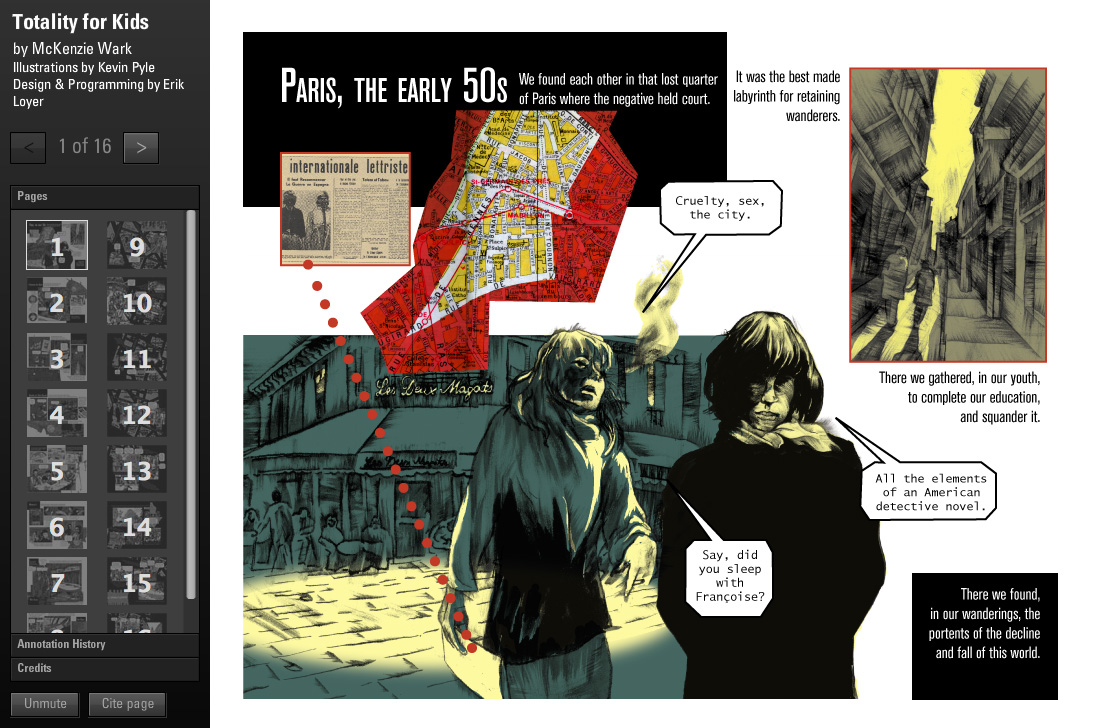The written passages perform a deep interweaving of annotation, quotation and allusion, perhaps a subtle homage to Walter Benjamin's desire to compose his final work The Arcades Project entirely of quotations.
- Steve Anderson, Editor's Introduction
Alternative views of Totality for Kids project data:
 All info and conversations from this project page
All info and conversations from this project page
http://vectors.usc.edu/xml/projects/totalityforkids_v1.xml
 RSS feed of the conversations from this project page
RSS feed of the conversations from this project page
http://vectors.usc.edu/rss/project.rss.php?project=99
http://vectors.usc.edu/xml/projects/totalityforkids_v1.xml
http://vectors.usc.edu/rss/project.rss.php?project=99
Editor's Introduction
Legends have their uses, as distillations of the wisdom of events, as ways of passing on a knowledge of situations. History as a discipline dissolves the event back into the archive, turning history (event) into history (text), consigning it to the past. The legend is a way of making the summation of past events present to future ones.This quotation from one of the comic book annotations in McKenzie Wark's Totality for Kids sums up the grand aspirations of the project, to make the ideas behind the Situationist International not only legible, but meaningful in a culture poised for submersion in the cynicism of neoliberal corporatism. Created in collaboration with designer Erik Loyer and comic artist Kevin C. Pyle, Totality for Kids forays into the pre-history of the SI, beginning in post-war Paris with the group's predecessor the Lettrist International, and continuing through the apotheosis of political radicalism marked by the general strike of May '68.
Wark's project is also cognizant of the dangers of academic treatments of movements that are predicated on rejection of institutional establishments writ large. "Like any glamour," he notes, "it is elusive, it slips away as soon as you try to grasp it. Exegesis kills it, this exegesis as much as any other." As an inoculation against prospective charges of academicization, this disclaimer rings slightly disingenuous, as Wark, Loyer and Pyle have clearly been at pains to avoid the type of exegesis that would reduce Situationism to simply another quixotic social movement that was too extreme for its own good. But the result remains intoxicatingly pleasurable - the kind of intoxication that brings revelation and flights of association far beyond the academic mandate.
The written texts of Totality for Kids exist in gentle conversation with Pyle's richly stylized illustrations and a lyrical yet energetic musical score performed by The Love Technology. The written passages perform a deep interweaving of annotation, quotation and allusion, perhaps a subtle homage to Walter Benjamin's desire to compose his final work The Arcades Project entirely of quotations. Like Benjamin's Arcades, Totality for Kids remains an open and arguably unfinishable project, illuminating both past and future through awareness of our situation in the present.
— Steve Anderson, October 17th, 2013


